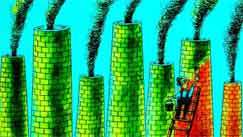Both business and consumer buyers are increasingly looking for Green, environmentally friendly products.
But how does either group know whether a vendor’s claimed environmental practices are real and actually delivering true environmental friendliness?
Supply Chain Digest Says...
|
 |
| Real sustainable companies have clearly defined and measurable environmental goals and communicate regularly on their progress. |
 |
What do you say? |
| Click here to send us your comments |
|
 |
| Click here to see reader feedback |
|
Writing recently on Forbes, com, Lou Elliott-Cysewski, co-founder and CEO of Coolperx (said by Elliott-Cysewski to be the first climate-neutral brand merchandise company in the world), says business and consumers need to be careful of “greenwashing.”
What is that? Elliott-Cysewski says greenwashing involves a company painting a picture that they are Green through false or misleading statements.
Elliott-Cysewski then offers six tips for separating real Green companies or products from the pretenders, as summarized below:
1. While common greenwashing terms like all-natural, nontoxic and healthy that may sound good, Elliott-Cysewski says, they usually don’t translate into a concrete certification or way to measure these claims.
2. Look for irrelevant statements, Elliott-Cysewski advises. These are technically true but irrelevant to sustainability. One example is “CFC-Free” - since CFCs are already banned by law, the claim may be true, but is not any an indication of sustainability.
3. Elliott-Cysewski say to look for obvious contradictions. “If it sounds like an oxymoron, it probably is,” he says. An example: there is no such thing as clean diesel, he says, adding that “Fossil fuel is the most significant contributor to climate change. Clean diesel or not, what goes in your car is burned and released into the atmosphere as carbon emissions.”
4. Look out for a “color palette” with no substance to back it up, Elliott-Cysewski says. He states that some companies are capitalizing on sustainability by simply adding green or other natural-looking tones to their product or packaging.
5. Elliott-Cysewski also warns about unfavorable trade-offs. He says some companies will promote one sustainable practice, but this may be overshadowed by a series of harmful ones. He cites as an example a company that might use environmentally friendly packaging made of recyclable cardboard to ship a product from the other side of the world.
6. Understand that “recyclable” and “recycled” are not the same, Elliott-Cysewski says. This is particularly true for plastics, he notes, adding that while several kinds of plastics (not all) are recyclable, the truth is that only 9% of plastics are recycled worldwide. He says this is because there’s no real demand for recycled plastic, so it largely ends up in landfills.
(See More Below)
|
CATEGORY SPONSOR: SOFTEON |
|
|
| |
|
|
 In addition, Elliott-Cysewski offers some other tips for finding Green suppliers.” In addition, Elliott-Cysewski offers some other tips for finding Green suppliers.”
Visit a potential vendor’s website and social media platforms and look for transparency and accountability, Elliott-Cysewski says. Real sustainable companies have clearly defined and measurable environmental goals and communicate regularly on their progress, especially on greenhouse gas offsets and emissions, water stewardship, landfill pollution and more.
Ask questions, Elliott-Cysewski stresses. “Don’t be afraid to reach out to companies and question their claims,” he adds. If their answers are vague and without substance, they probably fall under greenwashing.
Buyers should also check for 3rd-party verifications or audits. There are many sustainability certifications, Elliott-Cysewski notes, and adds that if the company has achieved several, that’s a very good sign.
Finally, Elliott-Cysewski recommends checking a current or potential vendor’s own suppliers. Where are they getting their products and materials from? “If you can find the answer, and it’s an equally sustainable company, it’s a good indication of their overall sustainability practices,” he notes.
If a company commits to Green, it will “boost sales and customer satisfaction, as well as employee attraction and engagement,” Elliott-Cysewski concludes.
What do you think of these avoid greenwashing? Let us know your thoughts at the Feedback section below.
|